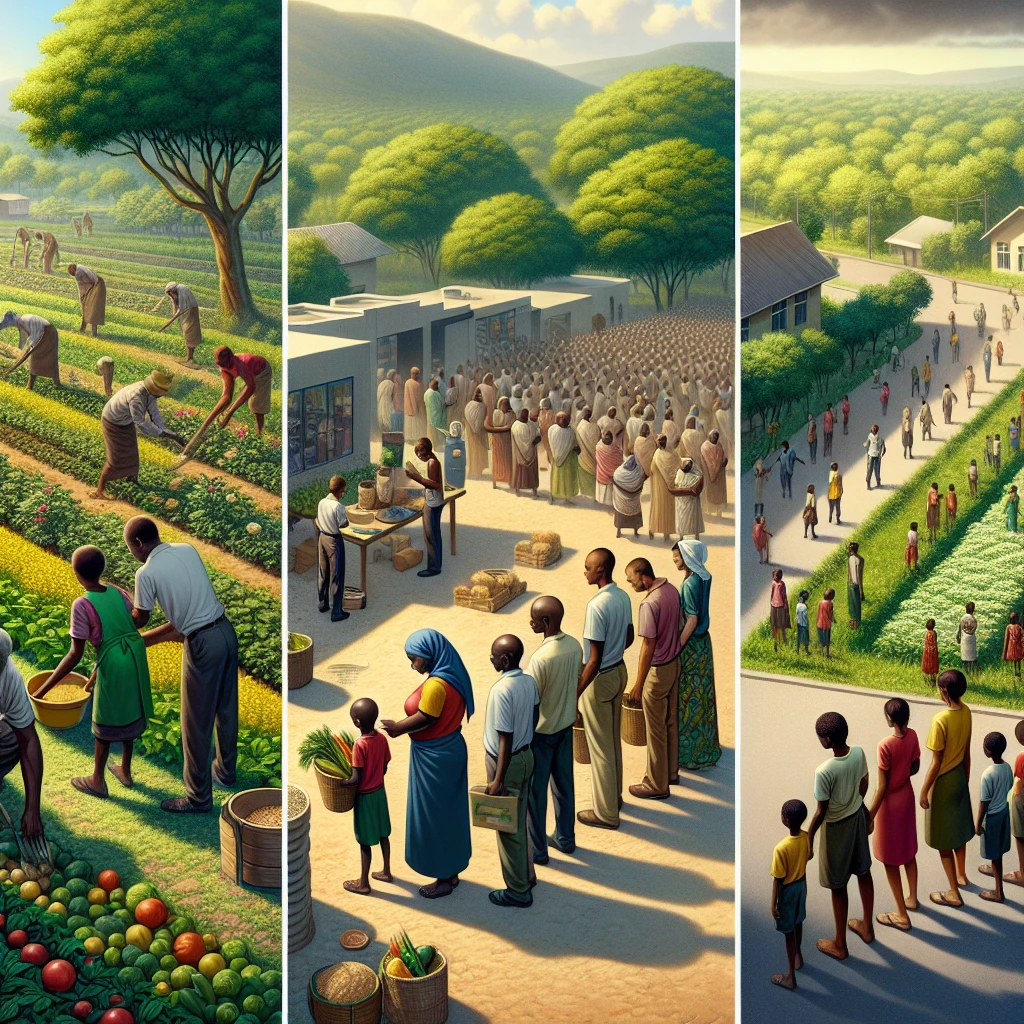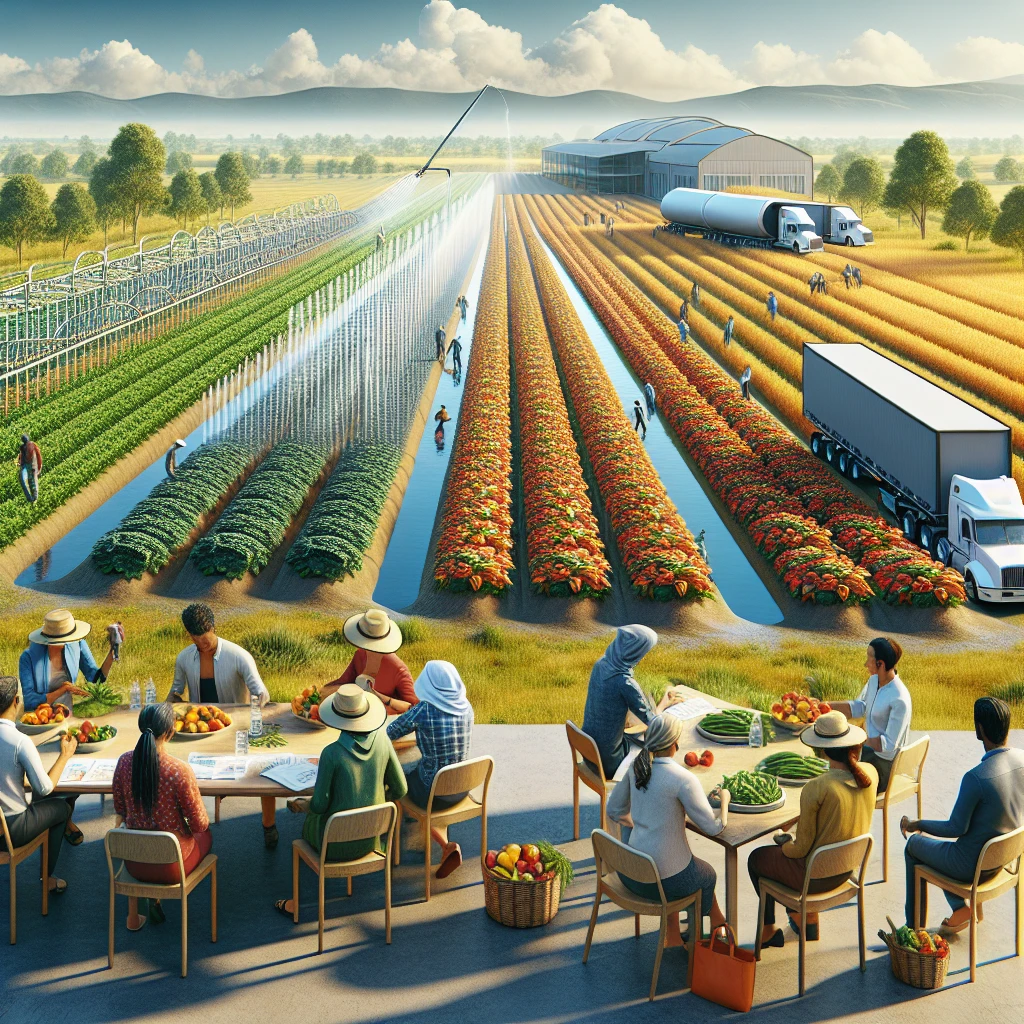

Food insecurity in Africa is a pressing issue, with an estimated 140 million people facing acute food insecurity, according to the 2022 Global Report on Food Crises. The situation is exacerbated by factors such as recurring drought, conflict, instability, and the COVID-19 pandemic, which has led to reduced food access and loss of jobs.
Rising global grain prices and climate change further contribute to the food crisis in Africa, making it a significant concern for the continent.
It is crucial to address food insecurity in Africa due to its detrimental impact on the population. The lack of access to adequate and nutritious food has led to high levels of malnutrition, particularly among children.
In addition, the food crisis has lasting adverse effects on economic growth and poverty, as increased death tolls shrink the workforce and hinder agricultural productivity. Moreover, untargeted interventions can be inefficient and inflate food prices, further aggravating the situation and impeding competition.
Efforts to combat food insecurity in Africa are necessitated by the mounting crisis, particularly in conflict-affected areas. Conflict remains the primary driver of acute food crises in Africa, with several countries facing active conflict experiencing the largest increases in food insecurity.
The war in Ukraine, supply chain shortages, and drought also compound the food security challenges in Africa. With the situation continuing to worsen, urgent and comprehensive measures are needed to address food insecurity in Africa in 2023 and beyond.
Check out this Youtube video: “Southern Africa Food Security Outlook Briefing (June 2023)” to gain insight into the current state of food insecurity in Africa and learn how organizations are working to address this pressing issue.
Current State of Food Insecurity in Africa 2023
Factors contributing to food insecurity in Africa
- Recurring drought and unpredictable climate patterns have significantly impacted agricultural productivity in many African countries.
- Conflict and political instability have disrupted food supply chains and hindered economic development, exacerbating food shortages.
Impact of climate change on food insecurity in Africa
- Climate change has led to more frequent and severe droughts, resulting in poor crop yields and increased food scarcity.
- Extreme weather events, such as floods and prolonged dry spells, have further undermined the resilience of agricultural systems, making it challenging to address food insecurity.
Effects of political instability on food insecurity in Africa
- Political instability has caused disruptions in food distribution and access, leading to increased food prices and reduced availability.
- Conflict-driven migration has displaced agricultural communities, leading to a loss of livelihoods and food insecurity for vulnerable populations.
Latest Updates on Food Insecurity in Africa 2023
Ongoing efforts to address food insecurity in Africa
- African governments have intensified efforts to address food insecurity by implementing agricultural initiatives and policies aimed at boosting food production.
- Programs such as the Comprehensive Africa Agriculture Development Programme (CAADP) are pivotal in providing support to small-scale farmers and enhancing agricultural productivity.
New strategies and initiatives to tackle food insecurity in Africa
- New strategies to combat food insecurity in Africa involve promoting sustainable farming practices, investing in climate-resilient agriculture, and enhancing food value chains.
- Initiatives such as the African Union’s Malabo Declaration prioritize sustainable agriculture and emphasize the need to reduce post-harvest losses and improve access to markets for smallholder farmers.
Role of international organizations in addressing food insecurity in Africa
- International organizations, including the World Food Programme (WFP) and the Food and Agriculture Organization (FAO), are playing a crucial role in addressing food insecurity in Africa.
- These organizations are providing vital support in terms of food aid, technical assistance, and capacity-building to enhance food security across the continent.
Challenges in Combating Food Insecurity in Africa 2023
Access to resources for fighting food insecurity in Africa
Access to resources for fighting food insecurity in Africa remains a critical challenge. Many communities lack basic infrastructure such as irrigation systems and storage facilities, hindering sustainable food production.
Additionally, limited access to modern agricultural technologies and financial resources further exacerbates the issue.
Distribution challenges for food aid in Africa
Distribution challenges for food aid in Africa persist due to inadequate transportation infrastructure and logistical barriers. This leads to delays in delivering essential food supplies to remote regions, contributing to food insecurity.
Furthermore, conflicts and political instability in certain areas hinder the efficient distribution of aid, intensifying the challenges.
Cultural and societal barriers to addressing food insecurity in Africa
Cultural and societal barriers play a significant role in perpetuating food insecurity in Africa. Deep-rooted traditions and beliefs about food consumption and production often clash with modern agricultural practices, making it challenging to introduce sustainable solutions.
Additionally, gender inequality and limited access to education hinder the advancement of innovative agricultural methods, further complicating efforts to address food insecurity.
Successful Interventions in Addressing Food Insecurity in Africa 2023
Examples of successful food security programs in Africa
-
One of the successful food security programs in Africa is the Purchase for Progress (P4P) initiative by the World Food Programme. It aimed to improve smallholder farmers’ access to markets, helping them increase their income and food security.
-
Another remarkable example is the African Development Bank’s Feed Africa Strategy. This initiative aims to transform African agriculture into a competitive, inclusive, and business-oriented sector that ensures food security for the continent.
Impact of empowering local communities in addressing food insecurity
-
Empowering local communities has had a profound impact on addressing food insecurity in Africa. For instance, in Malawi, community-owned seed banks have allowed farmers to access quality seeds, ensuring a sustainable supply for future harvests.
-
In Rwanda, community-based health insurance programs have empowered local communities to address malnutrition and food insecurity, leading to improved health outcomes and reduced vulnerability to food scarcity.
Importance of sustainable agricultural practices in promoting food security
- Sustainable agricultural practices play a pivotal role in promoting food security in Africa. For example, the adoption of conservation agriculture techniques in Zambia has led to improved soil fertility, increased crop yields, and enhanced resilience to climate change.
| Country/Program | Outcome |
|---|---|
| Malawi | Community-owned seed banks providing sustainable supply of quality seeds |
| Rwanda | Community-based health insurance programs addressing malnutrition and food insecurity |
Successful interventions in addressing food insecurity in Africa rely on impactful programs, community empowerment, and sustainable agricultural practices to ensure food security and build resilience in the face of challenges.
Promising Innovations for Tackling Food Insecurity in Africa 2023
Role of technology in addressing food insecurity in Africa
Digital Advancements: Technology is revolutionizing agriculture in Africa, offering solutions to food insecurity. For instance, digital tools are enhancing small and medium agricultural enterprises, transforming food systems, and improving accessibility to technologies, such as blockchain for land records in Ghana.
Importance of innovative approaches to food production and distribution
Agricultural Transformation: Innovative approaches are vital for improving food production and distribution in Africa. By leveraging digital tools and embracing biotechnology, the continent can witness substantial progress in food security, as seen in Ghana’s pilot project using blockchain.
Potential impact of biotechnology on food security in Africa
Biotechnological Revolution: The potential impact of biotechnology on food security in Africa is immense. Biotechnology holds promise in developing high-yielding, disease- and pest-resistant crops, leading to poverty alleviation, environmental conservation, and increased food production, as evident in the strides made in drought and disease-resistant crop development.
Government Initiatives to Address Food Insecurity in Africa 2023
Role of African governments in combating food insecurity
African governments play a crucial role in combating food insecurity by implementing policies and programs aimed at improving agricultural productivity, ensuring access to nutritious food, and addressing the root causes of hunger. Through strategic investments in infrastructure, technology, and farmer education, governments can boost food production and distribution, thereby reducing food scarcity and improving access to affordable food for their citizens.
Importance of policy interventions in promoting food security
Policy interventions are vital in promoting food security as they provide a framework for addressing systemic issues such as poverty, climate change, and infrastructure limitations that contribute to food insecurity. By enacting and enforcing policies that support sustainable agricultural practices, ensure fair market access for smallholder farmers, and prioritize nutrition education, governments can create an environment where food security becomes a sustainable reality for their populations.
Challenges and successes in implementing government-led food security programs
The challenges of implementing government-led food security programs often stem from resource limitations, bureaucratic inefficiencies, and external factors like climate change and economic instability. However, successful initiatives have shown that strategic partnerships with international organizations, private sector collaborations, and community engagement can lead to tangible improvements in food access and nutrition outcomes, paving the way for more effective and sustainable food security programs in Africa.
Role of Non-Governmental Organizations in Addressing Food Insecurity in Africa 2023
Impact of NGOs on food security in Africa
Non-Governmental Organizations (NGOs) have played a pivotal role in addressing food insecurity in Africa by implementing sustainable initiatives such as agricultural training programs, community gardens, and food distribution networks. Their efforts have significantly improved access to nutritious food, especially in remote and underserved areas, thereby alleviating hunger and malnutrition among vulnerable populations.
Importance of partnerships between NGOs and local communities
Partnerships between NGOs and local communities are crucial in tackling food insecurity in Africa. By collaborating with grassroots organizations and local leaders, NGOs can gain valuable insights into community needs and cultural preferences, ensuring that interventions are tailored to specific contexts.
These partnerships also foster community ownership and sustainable solutions, fostering long-term resilience and self-sufficiency in addressing food insecurity.
Challenges faced by NGOs in addressing food insecurity in Africa
NGOs encounter various challenges in addressing food insecurity in Africa, including inadequate funding, logistical constraints, political instability, and environmental factors such as droughts and climate change. Additionally, navigating complex bureaucratic processes and ensuring equitable resource distribution pose significant hurdles for NGOs operating in diverse African regions.
These challenges underscore the need for innovative strategies and collaboration to effectively combat food insecurity.
| Challenges Faced by NGOs in Addressing Food Insecurity in Africa |
|---|
| Inadequate Funding |
| Logistical Constraints |
| Political Instability |
| Environmental Factors |
Socio-Economic Impact of Food Insecurity in Africa 2023
Effects of food insecurity on the health of African communities
The effects of food insecurity on the health of African communities are devastating. Malnutrition leads to high infant mortality rates and widespread physical and mental development delays and disorders.
Chronic malnutrition globally accounts for 165 million stunted or underweight children, affecting their cognitive abilities and overall well-being. Furthermore, food insecurity is associated with increased risks of birth defects, anemia, and lower nutrient intakes, leading to a myriad of health challenges and chronic conditions in African communities.
Economic repercussions of food insecurity in Africa
The economic repercussions of food insecurity in Africa are profound. With limited access to food, communities struggle to engage in productive economic activities, leading to reduced productivity and economic growth.
Moreover, food insecurity contributes to poverty and exacerbates existing socio-economic inequalities. This hinders the overall economic development of African nations and perpetuates a cycle of poverty, further impacting the livelihoods of the people and the stability of the region.
Relationship between food insecurity and political stability in Africa
The relationship between food insecurity and political stability in Africa is intricate. Inequitable food distribution, poverty, and political unrest disrupt the ability of people to access food.
Additionally, food insecurity can both be a cause and a consequence of political instability and conflict. These factors create a volatile environment, making it challenging for governments to maintain political stability, address the needs of their citizens, and foster sustainable development.
Political instability and conflict not only contribute to food insecurity but also hinder agricultural development, exacerbating the challenges faced by African nations.
| Food Insecurity Impact | Description |
|---|---|
| Health | Devastating effects on child development and overall well-being |
| Economy | Hindrance to economic growth and perpetuation of poverty |
| Politics | Intricate relationship with political instability and conflict |
This table summarizes the multi-faceted impact of food insecurity on African communities, emphasizing the dire consequences on health, economy, and political stability.
Globally, addressing food insecurity in Africa is crucial for sustainable development and the well-being of its people. Efforts to combat this issue should encompass holistic strategies that encompass not only food provision but also economic empowerment, healthcare interventions, and political stability initiatives.
The socio-economic impact of food insecurity in Africa cannot be underestimated, and concerted efforts are imperative to address this critical challenge and pave the way for a brighter future for the continent.
Future Outlook for Food Insecurity in Africa 2023
Predicted trends in food insecurity in Africa
The predicted trends for food insecurity in Africa in 2023 are alarming. With prolonged droughts and extreme weather events caused by the climate crisis, an estimated 23 million people are at risk of acute food insecurity in the eastern Horn of Africa, particularly in Ethiopia, Kenya, and Somalia.
This has led to a significant increase in hunger, with food production being severely impacted by these environmental challenges.
Opportunities for progress in addressing food insecurity
Despite the challenges, there are opportunities for progress in addressing food insecurity in Africa. Trade liberalization and import diversification could help stabilize regional food supply and prices.
Additionally, revolutionizing food production by leveraging fertilizers produced in Africa and diversifying imports, as exemplified by Zambia’s maize harvests, could contribute to long-term stability in the region’s food supply.
Importance of long-term sustainability in promoting food security
Long-term sustainability is paramount in promoting food security in Africa. The continent’s food system sustainability is imperative for addressing food insecurity.
Strengthening Africa’s food systems by increasing resilience to climatic events and enhancing infrastructure for marketing and distribution will be crucial for long-term food security and sovereignty.
Recommended Amazon Products for Addressing Food Insecurity in Africa
Here’s a curated list of products that can help in addressing food insecurity in Africa. These recommendations are based on the criteria of functionality, price, and reviews.
Water Purification Tablets


Water purification tablets are essential for providing clean and safe drinking water in areas affected by food insecurity. These tablets are easy to use, affordable, and have received positive reviews for their effectiveness in treating contaminated water.
Portable Solar Power Bank


A portable solar power bank can provide a reliable source of power for charging essential devices such as mobile phones and small appliances. This product is ideal for areas with limited access to electricity, and its functionality and durability make it a valuable asset in addressing food insecurity.
Emergency Food Rations


Emergency food rations are convenient, long-lasting food supplies that can sustain individuals and families during times of food scarcity. These rations offer essential nutrients, are reasonably priced, and have garnered positive feedback for their taste and quality.
Agricultural Training Tools


Agricultural training tools such as gardening kits, seeds, and small-scale farming equipment can empower communities to produce their own food. These tools contribute to sustainable agricultural practices, enable self-sufficiency, and have received acclaim for their impact on food security initiatives.
Community Water Well Drilling Kit


A community water well drilling kit provides the resources needed to establish clean water sources, benefitting entire communities facing food insecurity. This kit promotes long-term water accessibility, community empowerment, and has been highly regarded for its contribution to sustainable development.
Top Recommended Product for Addressing Food Insecurity in Africa
If you’re looking for the best solution for addressing food insecurity in Africa, we highly recommend Portable Solar Power Bank (https://www.amazon.com/s?k=portable+solar+power+bank). This product offers reliable power sources for essential devices, making it a crucial asset in areas with limited electricity access. Its functionality, durability, and impact on addressing food insecurity make it the top recommended product for this purpose.


| Product | Pros | Cons |
|---|---|---|
| Water Purification Tablets | – Easy to use | – May have a slight taste |
| Portable Solar Power Bank | – Portable and durable | – Initial cost may be high |
| Emergency Food Rations | – Long shelf life | – Limited variety of meals |
| Agricultural Training Tools | – Empowers communities | – Requires training for use |
| Community Water Well Drilling Kit | – Establishes long-term water sources | – Requires technical expertise |
READY TO IMPROVE YOUR FOOD INSECURITY EFFORTS? CHECK OUT PORTABLE SOLAR POWER BANK (https://www.amazon.com/s?k=portable+solar+power+bank) TODAY FOR THE BEST RESULTS!


Conclusion
The issue of food insecurity in Africa in 2023 remains a significant challenge, with many people experiencing hunger and malnutrition. The lack of access to nutritious food continues to have detrimental effects on the health and well-being of individuals and communities in the region.
Additionally, food insecurity in Africa in 2023 is exacerbated by factors such as climate change, economic instability, and conflict, which further contribute to food shortages and limited access to food resources. These complex challenges require comprehensive and sustainable solutions to address the root causes of food insecurity and build resilience within the communities affected.
Furthermore, efforts to combat food insecurity in Africa in 2023 should involve collaboration between governments, international organizations, and local communities to implement effective policies and programs that promote food security, sustainable agriculture, and equitable access to resources. By working together, it is possible to make meaningful progress in reducing food insecurity and improving the lives of millions of people across the continent.
Frequently Asked Questions
What is the rate of food insecurity in Africa 2023?
What are the top 5 food insecure countries 2023?
Is there a drought in the Horn of Africa 2023?
How is Africa affected by food insecurity?
How many people go hungry in Africa 2023?
How can we help starving Africans?
What are three reasons people in Africa find it difficult to obtain the food resources they need?
Is Nigeria at risk for food crisis in 2023?
Reference Links
- https://www.ncbi.nlm.nih.gov/pmc/articles/PMC9100282/
- https://www.un.org/en/chronicle/article/biotechnology-solution-hunger
- https://www.washingtonpost.com/news/monkey-cage/wp/2017/10/30/four-things-you-should-know-about-food-security-in-africa/
- https://link.springer.com/chapter/10.1007/978-3-031-15703-5_37



